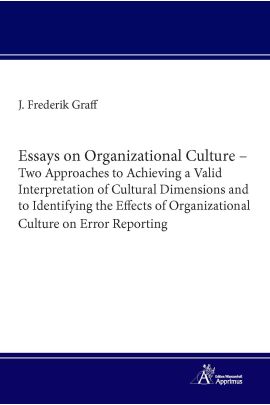This dissertation consists of four essays which approach the topic of organizational culture from substantially and methodically different directions:
CAVIR – Correspondence Analysis in Virtual Reality: The major challenge of correspondence analysis is to interpret the mapping correctly. Due to the missing axis, distances can easily be under- or overestimated, which can lead to a misinterpretation of data. CAVIR is a software which supports users by enabling a virtual three-dimensional representation of the CA point cloud and providing different tools for the analysis. Furthermore, the free rotation of the point cloud means that users always have a correct view of the data.
Correspondence Analysis in Ternary Diagrams – A graphical approach to improving the validity of the interpretation of CA point clouds: In ternary diagrams, the sides of a triangle represent the three axes of a coordinate system. To be plottable in a ternary diagram, coordinates need to meet some mathematical conditions. In this essay, a formula is developed to transform three-dimensional coordinates in such a way as to make correspondence analysis point clouds plottable in a ternary diagram.
Cultures and Errors – An Experimental Approach to the Effect of Organizational Culture on Error Cover-Up: Errors are an inevitable part of life, but an optimal reaction requires both successful error detection and openness toward discussing them. This can be difficult if employees have incentives to hide errors. A possible solution may be an adequate organizational culture. In a laboratory experiment, it is examined whether a learning-friendly culture can motivate participants to reveal their errors even though monetary incentives induce the opposite effect.
The Influence of Error Culture and Task-Inherent Learning Opportunities on Error Reporting Behavior – A Laboratory Experiment: Errors can entail important information for individual and organizational learning, but in order to learn from errors, a culture is needed which encourages employees to report their errors. However, recent experimental research indicates that it is not culture alone that directs error reporting, but that a task-inherent learning opportunity has at least a moderating effect. In this essay, a novel experimental design is developed in order to disentangle the effects of culture and learning on the willingness to report errors.
| Autor | Graff, Jan Frederik |
|---|---|
| Lieferzeit | 3-4 Tage |
| Gewicht | 0.32 kg |
| Erscheinungsdatum | 01.04.2016 |
Betriebswirtschaftslehre
Essays on Organizational Culture – Two Approaches to Achieving a Valid Interpretation of Cultural Dimensions and to Identifying the Effects of Organizational Culture on Error Reporting
Kurzbeschreibung
This dissertation consists of four essays which approach the topic of organizational culture from substantially and methodically different directions. The first (methodological) part presents two ways of a graphical representation of three-dimensional point clouds. The second part addresses the questions whether an adequate organizational culture can motivate employees to report errors. Two laboratory experiments test the effects of cultural and other variables on the willingness to report errors.

